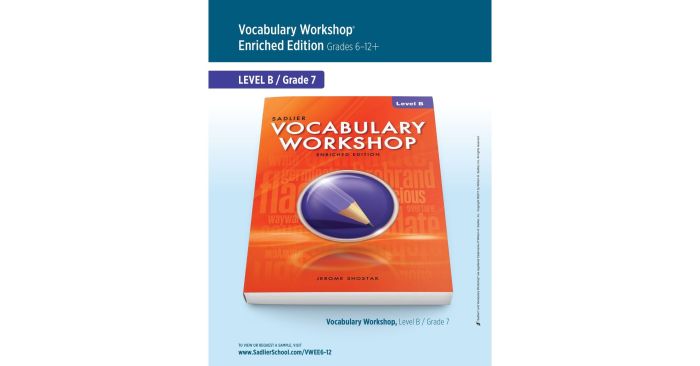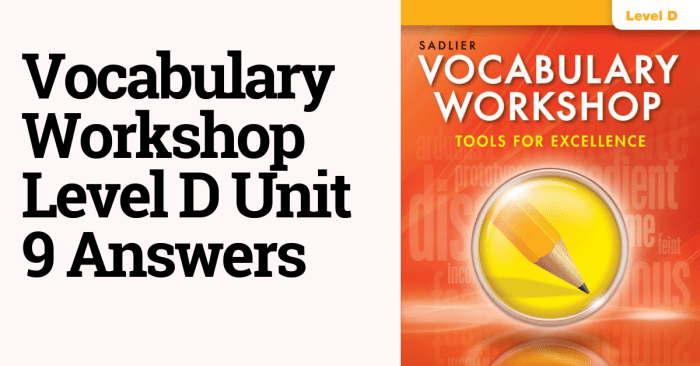Embarking on vocabulary workshop level d unit 9, this comprehensive guide delves into effective strategies for vocabulary expansion, word analysis, and thematic organization. By exploring the nuances of word roots and affixes, students will gain a deeper understanding of new words.
This guide provides engaging activities, games, and assessment methods to reinforce vocabulary comprehension and growth.
Through the exploration of vocabulary in context, students will develop a strong foundation in using words effectively. With a focus on practical application, this guide empowers educators and learners alike to enhance their vocabulary skills and achieve language mastery.
Vocabulary Development Strategies
Expanding vocabulary is crucial for effective communication and academic success. At the D unit 9 level, students encounter a diverse range of new words and concepts. To facilitate vocabulary growth, several strategies can be employed:
1. Contextual Learning: Expose students to new words in meaningful contexts through reading, listening, and discussions. Encourage them to infer meanings from surrounding text or conversations.
2. Word Lists and Flashcards: Create targeted word lists and encourage students to actively engage with them through flashcards, games, and spaced repetition techniques.
3. Root Word and Affix Analysis: Help students understand the structure of words by breaking them down into root words and affixes. This enhances their ability to decode new words and expand their vocabulary.
Word Analysis and Root Words

Understanding word roots and affixes is essential for vocabulary development. In Unit 9, students encounter numerous root words and affixes that can be traced back to Latin or Greek origins:
- Root word “chron”:meaning “time” (e.g., chronicle, chronology, chronometer)
- Affix “-cide”:meaning “to kill” (e.g., homicide, insecticide, pesticide)
- Affix “-graph”:meaning “to write” (e.g., biography, geography, paragraph)
By analyzing word parts, students can gain a deeper understanding of new words and their relationships to existing vocabulary.
Thematic Vocabulary
Organizing vocabulary into thematic categories helps students grasp the interconnectedness of words and their usage in specific contexts. Unit 9 vocabulary can be grouped as follows:
| Theme | Vocabulary Words |
|---|---|
| Time | chronicle, chronology, chronometer |
| Science | hypothesis, experiment, laboratory |
| Literature | biography, autobiography, novel |
This organization allows students to see how words are related and used within different domains.
Vocabulary in Context
To fully grasp the nuances of vocabulary, it is essential to examine how words are used in context:
- “The scientist conducted a meticulous experiment to test his hypothesis.”
- “The autobiography provides a detailed account of the author’s life experiences.”
- “The chronometer accurately measured the passage of time during the race.”
By analyzing vocabulary in context, students develop a deeper understanding of word usage and the subtle shades of meaning they convey.
Vocabulary Activities and Games

Engaging activities and games can reinforce vocabulary learning and make it enjoyable:
- Word Charades:Students take turns acting out vocabulary words while others guess.
- Vocabulary Bingo:Create bingo cards with vocabulary words and have students listen to sentences containing the words.
- Root Word and Affix Hunt:Provide students with texts and ask them to identify and classify root words and affixes.
These activities provide opportunities for students to actively engage with vocabulary and enhance their retention.
Assessment and Evaluation: Vocabulary Workshop Level D Unit 9

Assessing students’ vocabulary comprehension and growth is crucial:
- Vocabulary Quizzes:Test students’ knowledge of specific vocabulary words and their meanings.
- Cloze Passages:Provide students with passages with missing vocabulary words and have them fill in the blanks.
- Vocabulary Journals:Encourage students to keep journals where they record new words, definitions, and examples of usage.
By using these assessment methods, teachers can identify areas for improvement and provide targeted support to enhance vocabulary growth.
Query Resolution
What are the key strategies for effective vocabulary expansion?
Vocabulary expansion strategies include context-based learning, repetition, root word analysis, and engaging activities.
How does word analysis contribute to vocabulary development?
Word analysis helps students understand the structure and meaning of words, making it easier to learn and retain new vocabulary.
What is the significance of thematic vocabulary organization?
Thematic organization helps students see the relationships between words and concepts, facilitating deeper understanding and retention.